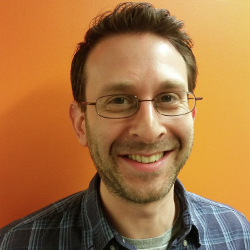By Myles Helfand

"If you have a deadly disease, it is only proper that other people be warned against getting infected by you," the comment began. It went quickly downhill from there.
"The HIV infected should be placed on a mandatory tracking list and be tattooed with the BIOHAZARD symbol, just above the genitals, as fair warning," it continued.
"They should also have a distinctive license and license plate for the protection of LEO's (law enforcement officials) they encounter," it concluded, just for good measure.
All of this, ironically, was recently posted on an article on TheBody.com entitled, "What Does HIV/AIDS Stigma Look Like in Your Life?"
I deleted the comment, of course; TheBody.com isn't a place for people to beat each other down. But in a twisted way, I appreciated the commenter's inadvertently perfect crystallization of what HIV stigma looks like in the U.S. today – more than a generation after we learned what the virus is, how it works, and how dangerous it can be for all of humanity when we ignorantly condemn a broad swath of society for living with it.
There's so much about the comment that we could unpack and dissect, but the one that really sticks with me is the feeling it holds at its core that HIV somehow renders a person non-human. That it makes them a thing: one of "the HIV infected." An object to be isolated, tagged as toxic, and cordoned off from the uncorrupted.
I mean, I suppose I could try to address the comment by mentioning pneumonia, influenza, tuberculosis, malaria, hepatitis B or C, infectious diarrhea and the vast, varied constellation of microbes that have attempted to use the human body as an incubator for as long as human bodies have existed on Earth – and which the commenter is likely exposed to (or may even expose others to) on a near-daily basis. In some cases, exposure to that microbe occurs through the biologically imperative action of having sex. In others, it's through the biologically imperative action of breathing air.
Or I could try to explain why it's kind of unlikely that a person with HIV who's driving down a highway will have condomless sex with the police officer who stops them for speeding. Or that, even if a porn video broke out in the middle of that traffic stop, the officer still wouldn't be at risk if the person was on HIV treatment and had an undetectable viral load.
Or I could ask what additional personal characteristics should warrant such a high level of warning for others who might encounter those people in the world. What level of abstract theoretical risk should trigger a tattoo- or license plate-level notice? Just HIV? Maybe syphilis, too? All infectious diseases, for good measure? How about mental illness? Epilepsy? Unstable blood sugar levels due to diabetes? Texting while driving?
A part of me feels there's not much point in responding, because any reply I make would be a rational response to a completely irrational train of thought. For more than 30 years, the global HIV community has tried to use research, science and education to counter presumption, ignorance and silence. Yet we still find ourselves surrounded by people who believe that HIV stigma and discrimination isn't just acceptable, but that it's necessary.
It's exhausting. It's demoralizing. It can make resistance feel pointless.
And, I'm sorry to say, I don't have any answers.
Look, I realize I'm not remotely the first person to write about how much HIV stigma sucks, and I unfortunately won't be remotely the last person who'll write about it either. I also don't pretend I've got a magic solution to the problem; if anything, I think it's dangerous for us to pretend there is one out there, just waiting to be discovered. Doing so ignores the reality of how wide a turning radius we often have as a society.
We may be more interconnected as a species today than we've ever been, but in many ways we've also become more fragmented, more easily distracted and more forcefully isolated (both online and off). We're also more closed off from points of view that might change our minds – as well as from people whose minds we might be able to change.
I don't think there's an ideal way to counter stigma and bigotry. There's no one-size-fits-all approach to acceptance. I'm not even writing this article to offer advice; there's plenty of that already out there, on my website and those run by the other writers who share this column (among many other people).
I'm just writing this article to say that I know. I hear the stigma, I see it, and I accept that it exists – and I hate that it does. I can wipe away a single destructive comment, but I can't make the stigma go away. Instead I acknowledge it.
I'm just one person. But if you feel this way, too, then there's two of us in this boat. If you know another person who does, then we've got three. Maybe it's not unreasonable to suspect there are a whole lot more, even though this fragmented world of ours can often make it feel like there aren't.
Maybe, just maybe, if enough of us acknowledge HIV stigma, and make the world aware that we acknowledge it, we'll find there are enough of us on this boat to help humanity slowly turn away from it.
Or maybe it's enough, for some of us, just to know we're not alone. That try as some might to label and judge, they can't take away our humanity.










